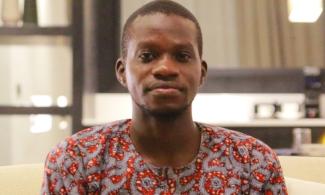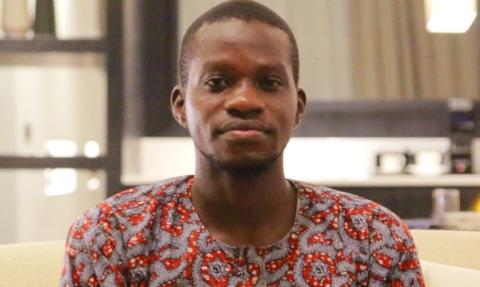
As a young African living in the 21st century, a reality one cannot but confront is the age-long tradition that strips many a naive of independence of thought and action. Beneath this seemingly harmless reality lies an expectation to confer in absolute terms, wisdom on people solely on the basis of the number of grey strands on the head. What in all probability started as an offshoot of communalism in those days when men of character litter the rank and file of the society—a time when adults speak less words of admonition than they espouse sterling qualities—is being retained by a generation that treats morality and every act of forthrightness in ways suggesting absolute relativism.

“When we revolt it’s not for a particular culture. We revolt simply because, for many reasons, we can no longer breathe.”—Frantz Fanon.
As a young African living in the 21st century, a reality one cannot but confront is the age-long tradition that strips many a naive of independence of thought and action. Beneath this seemingly harmless reality lies an expectation to confer in absolute terms, wisdom on people solely on the basis of the number of grey strands on the head. What in all probability started as an offshoot of communalism in those days when men of character litter the rank and file of the society—a time when adults speak less words of admonition than they espouse sterling qualities—is being retained by a generation that treats morality and every act of forthrightness in ways suggesting absolute relativism.
They’ve turned the leadership space to an abode that mimics the African jungle, embracing suffrage to carve a genre of democracy that—warts and all—remains indistinguishable from despotism. In a blatant disregard to decorum, the millennial grew up to learn politics and governance as isolated entities from morality and accountability. They scare men and women of conscience away from partaking in the running of the state via a lethal combination of word and action. They tell you to drop your Muslim beliefs at home before venturing into civic discourse; they lecture you on the imperative of jettisoning your Christian-induced virtues if you are to remain afloat in the murky waters of politics.
While we looked on, societal irritants have redefined, recalibrated and reshaped civics, governance and leadership in their own perverted image, perfecting a worldview wherein politics became synonymous with treachery and opportunism. It has got to the extent where politicians have made a career of politics. A couple of weeks ago, a friend shared the curriculum vitae of Ibrahim Layode, a lawmaker representing Badagry constituency I who had “legislation” as his occupation! Pray what this means other than a redefinition of reality, for nothing in politics connotes occupation.
With this absurdity, our nation has thus become one wherein the most hardworking are perhaps the most destitute, an analogy that speaks to the misfortune of the monkey in relation to the baboon. The citizens toil day and night to feed and clothe; the politicians sit in opulent spaces, apportioning all they can to satiate their lecherous lifestyles. With the politicians in perfect sync with the grim reality that the people are caught in a perpetual struggle with the most basic of needs (food, water and shelter especially) as espoused by Abraham Maslow, not to mention the sedating effects our perverted embrace of the two imported religions have on the masses, the thought of an uprising on the part of the people that could in any way challenge this unjust status quo is being taking for granted.
Talk of a clenched fist of an emaciated beast!
As they did with democracy, they spurned our much cherished tradition to embrace the spiritualism of the white expansionists, pale-skinned opportunists whose land was made flourish by our ancestors who were forced to till from sunup to sundown in a gruesome atmosphere that puts to rest the misplaced impression of the devil having a monopoly of evil. Seeing how much foreign religiosity could be deployed as a tool to manipulate and enslave the minds of the people, a massive, wholesome embrace of the slavemasters' religion has been made to populate this space in defiance to the voices of science ad reason which have stridently pointed out fallacious positions religionists base their mostly icky arguments upon.
The contending issue here is how members of this generation allowed the preceding one force them to become conformists, accepting norms strictly on the basis of how dated its practice. We grew up with the narrow perspective of being ready for marriage once there is a job. It never occurred to us to query established practices, to question why every lady must get married for a crown to be seen on her head, why we must begin a meeting with prayers and close with worship songs even if we started three hours behind schedule. We need agile minds to put to test—even if for the sake of academic and recreational purposes—the rationale behind men paying the bride price and belief that they have the sole responsibility of running the home. Can we have folks unlock the probable fallacies beneath the pervading practice barring women from marrying more than one man while a man could take as many as possible based on religious and/or traditional inclinations?
How did the practice of bowing and prostration as reflections of respect and good training when greeting an elder come into being? Can the perception of tradition as an act begun by some Palaeolithic persons—who were probably acting in ignorance—suffice to shatter every idea and custom we’ve been made to conform with or at least reinvent them to suit the realities of the modern world driven by an ever-changing reality of scientific breakthroughs? Why are very few people asking tough questions on the reasons for our holding on to the aspects of tradition that hold potential for self-aggrandizement and self-perpetuation while at the same time dismissing other—mostly core—aspects of culture as consequences of barbarity?
The abolishment of cultural landmarks while retaining the stool serves a case for this discussion. Existing without a single backing of the constitution, isn’t it ludicrous that the stool still retains patronage and has since the coming of democratic governance become more attractive when in fact it ought to have committed hara-kiri? Does political kings as we’ve come to see them all not seeing the vivid contradiction in holding a staff that can neither command the living nor coax the dead into submission?
Why have we suddenly become a generation of non-thinkers? Jesus was sold to us as god in human flesh who walked on water, turned water into wine to feed multitudes, spoke at infancy and to cap the whole story, was a consequence of immaculate birth. Muhammad is renowned for his bravery and prophesy, starting his foray into evangelism as an unlettered, unschooled young desert man. These were sold to both adherents on the Christian and Muslim divide who were hitherto into the worship of various local deities whom were accorded huge respect and admiration. But, what in the features of the two influential figures above set them apart from the gods native to Africans? Did the Yorubas not have a history of immortal gods, powerful figures who defy death, reinventing themselves as objects of mystery whose marks still litter the length and breadth of the region? Can the same not be said about the Igbos, Fulanis, Ibibios and others? Could our embrace of everything foreign be a consequence of inferiority complex or a realisation that our culture is in fact inferior?
This intervention is intended to instigate a new wave of thinking that could cause a total disruption in the very core of our belief system. The questions it ask and challenges it pose are consequences of what Brother Kwame Ture in relation to racial inequality in the United States calls “anti-racist, racist.” The youth has been the sole victim of ageism, a reality they’ve been made to asphyxiate under for several years. No one amongst members of the old generation will take us serious until we all become anti-ageist, ageists.
Africa, more than ever is in dire need of iconoclasts if it is to return to the path of egalitarianism. A place to begin is to ask questions and demand for answers not only from the people who are responsible for running this country aground but from their conspirators who hide beneath religion, tradition and age to enslave their fellow being. We must query why as Africans, we start our lives as bold, courageous beings only to have it replaced by timidity as we age.
Modiu writes via [email protected]